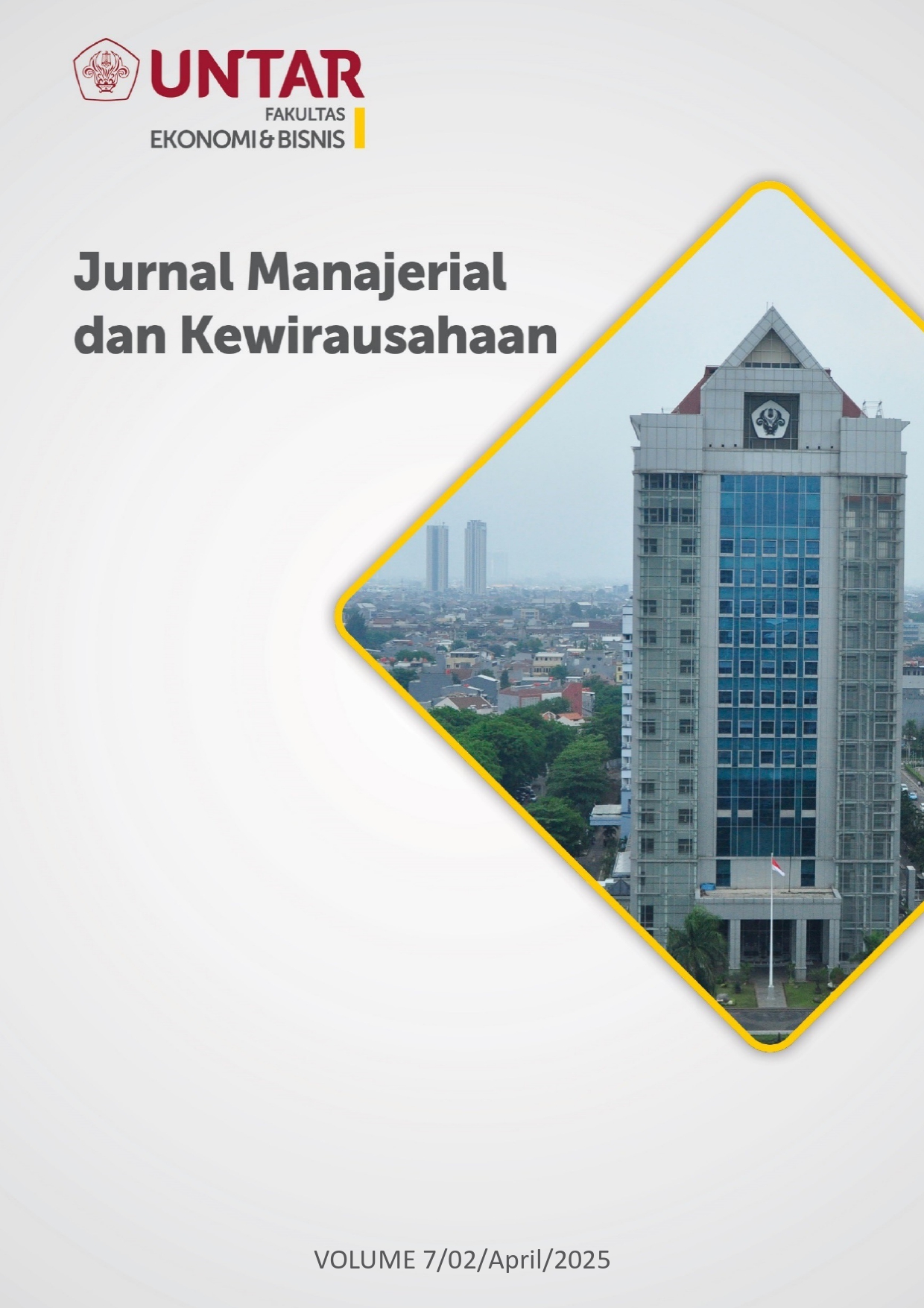Meningkatkan Intensi Berwirausaha pada Mahasiswa FEB UNTAR: Peran Efikasi Diri dalam Hubungan antara Pendidikan Kewirausahaan, Pola Pikir, dan Kreativitas
Main Article Content
Abstract
This research explores the impact of entrepreneurship education, entrepreneurial mindset, and creativity on entrepreneurial intention, with self-efficacy serving as a mediating variable among FEB UNTAR students. The study utilizes Partial Least Squares - Structural Equation Modeling (PLS-SEM) to analyze the relationships between these variables. The findings reveal that entrepreneurship education has a significant positive effect on both entrepreneurial mindset and entrepreneurial intention. Furthermore, entrepreneurial mindset and creativity also positively influence entrepreneurial intention. Self-efficacy plays a significant mediating role in enhancing the relationships between entrepreneurship education, mindset, and creativity with entrepreneurial intention.
Article Details

This work is licensed under a Creative Commons Attribution-NonCommercial-ShareAlike 4.0 International License.
This work is licensed under a Jurnal Muara Ilmu Ekonomi dan Bisnis Creative Commons Attribution-ShareAlike 4.0 International License.,/p>
References
Barba-Sánchez, V., Mitre-Aranda, M., & del Brio-González, J. (2022). The entrepreneurial intention of university students: an environmental perspective. European Research on Management and Business Economics, 28(2), 100184. https://doi.org/10.1016/j.iedeen.2021.100184
Bauman, A., & Lucy, C. (2021). Enhancing entrepreneurial education: developing competencies for success. The International Journal of Management Education, 19(1), 100293. https://doi.org/10.1016/j.ijme.2019.03.005
Beaty, R. E., & Kenett, Y. N. (2023). Associative thinking at the core of creativity. Trends in Cognitive Sciences, 27(7), 671–683. https://doi.org/10.1016/j.tics.2023.04.004
Boldureanu, G., Ionescu, A. M., Bercu, A.-M., Bedrule-Grigoruță, M. V., & Boldureanu, D. (2020). Entrepreneurship Education through Successful Entrepreneurial Models in Higher Education Institutions. Sustainability, 12(3), 1267. https://doi.org/10.3390/su12031267
Cui, J., & Bell, R. (2022). Behavioural entrepreneurial mindset: How entrepreneurial education activity impacts entrepreneurial intention and behaviour. The International Journal of Management Education, 20(2), 100639. https://doi.org/10.1016/j.ijme.2022.100639
Databoks. (2023). Februari 2023: Tingkat Pengangguran di Indonesia.
Fuady, I., Prasanti, D., & Indriani, S. S. (2020). Penerapan teori plan behavior: faktor yang mempengaruhi niat perilaku hidup bersih dan sehat. Jurnal Berkala Kesehatan, 6(1), 24–30.
Gunawan, V., & Wijaya, A. (2023). The effect of attitudes, social environment, and self-efficacy on entrepreneurship intention of S1 Management students in West Jakarta. International Journal of Application on Economics and Business, 1(1), 418–426. https://doi.org/10.24912/v1i1.418-426
Hair, J., & Alamer, A. (2022). Partial Least Squares Structural Equation Modeling (PLS-SEM) in second language and education research: Guidelines using an applied example. Research Methods in Applied Linguistics, 1(3), 100027.
Handayati, P., Wulandari, D., Soetjipto, B. E., Wibowo, A., & Narmaditya, B. S. (2020). Does entrepreneurship education promote vocational students’ entrepreneurial mindset? Heliyon, 6(11), e05426. https://doi.org/10.1016/j.heliyon.2020.e05426
Hueso, J. A., Jaén, I., & Liñán, F. (2021). From personal values to entrepreneurial intention: a systematic literature review. International Journal of Entrepreneurial Behavior & Research, 27(1), 205–230.
Jiatong, W., Murad, M., Bajun, F., Tufail, M. S., Mirza, F., & Rafiq, M. (2021). Impact of Entrepreneurial Education, Mindset, and Creativity on Entrepreneurial Intention: Mediating Role of Entrepreneurial Self-Efficacy. Frontiers in Psychology, 12. https://doi.org/10.3389/fpsyg.2021.724440
Luo, L., Guo, M., Huang, J., & Yang, J. (2022). Research on the effect of an entrepreneurial environment on college students’ entrepreneurial self-efficacy: the mediating effect of entrepreneurial competence and moderating effect of entrepreneurial education. Sustainability, 14(11), 6744.
Morris, M. H., & Tucker, R. (2023). The entrepreneurial mindset and poverty. Journal of Small Business Management, 61(1), 102–131.
Neneh, B. N. (2022). Entrepreneurial passion and entrepreneurial intention: the role of social support and entrepreneurial self-efficacy. Studies in Higher Education, 47(3), 587–603.
Riyanto, S., & Hatmawan, A. A. (2020). Metode Riset Penelitian Kuantitatif. Deepublish.
Runco, M. A., & Pritzker, S. R. (2020). Encyclopedia of creativity. Academic press.
Saleh, R., & Brem, A. (2023). Creativity for sustainability: An integrative literature review. Journal of Cleaner Production, 388, 135848.
Saoula, O., Shamim, A., Ahmad, M. J., & Abid, M. F. (2023). Do entrepreneurial self-efficacy, entrepreneurial motivation, and family support enhance entrepreneurial intention? The mediating role of entrepreneurial education. Asia Pacific Journal of Innovation and Entrepreneurship, 17(1), 20–45.
Setiaman. (2020). Analisa Parsial Model Persamaan Struktural Dengan Software SMART-PLS Versi 3. Deepublish.
Soelaiman, L., Keni Keni, & Puspitowati, I. (2024). Empowering entrepreneurial intentions: educational support and self-efficacy in MBKM context. Jurnal Manajemen, 28(1), 23–44. https://doi.org/10.24912/jm.v28i1.1760
Sugiyono, S., & Lestari, P. (2021). Metode penelitian komunikasi (Kuantitatif, kualitatif, dan cara mudah menulis artikel pada jurnal internasional). eprints.upnyk.ac.id.
Supriandi, S. (2022). Pengaruh Modal Sosial, Kapabilitas Finansial, Orientasi Kewirausahaan Terhadap Daya Saing Bisnis Berkelanjutan Serta Implikasinya Pada Kinerja Umkm Industri Kuliner Di Kota Sukabumi. Skripsi Universitas Nusa Putra.
Tan, T., & Wijaya, A. (2024). Factors influencing entrepreneurial intentions mediated by entrepreneurship education in S1 Management students of Tarumanagara University. International Journal of Application on Economics and Business, 2(3) 29-49, https://doi.org/10.24912/ijaeb.v2i3.39-49
Wang, X. H., You, X., Wang, H. P., Wang, B., Lai, W. Y., & Su, N. (2023). The Effect of Entrepreneurship Education on Entrepreneurial Intention: Mediation of Entrepreneurial Self-Efficacy and Moderating Model of Psychological Capital. Sustainability (Switzerland), 15(3). https://doi.org/10.3390/su15032562
Wegner, D., Thomas, E., Teixeira, E. K., & Maehler, A. E. (2020). University entrepreneurial push strategy and students’ entrepreneurial intention. International Journal of Entrepreneurial Behavior & Research, 26(2), 307–325.
Yadav, A., & Bansal, S. (2021). Viewing marketing through entrepreneurial mindset: a systematic review. International Journal of Emerging Markets, 16(2), 133–153.
Yousaf, U., Ali, S. A., Ahmed, M., Usman, B., & Sameer, I. (2021). From entrepreneurial education to entrepreneurial intention: a sequential mediation of self-efficacy and entrepreneurial attitude. International Journal of Innovation Science, 13(3), 364–380.



